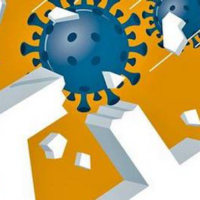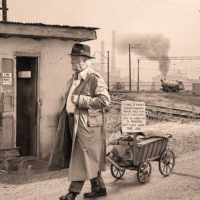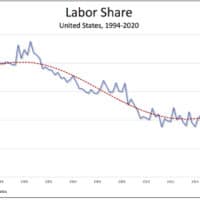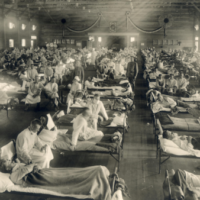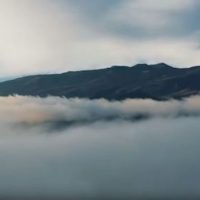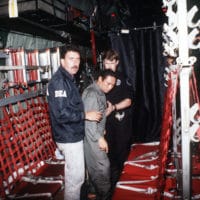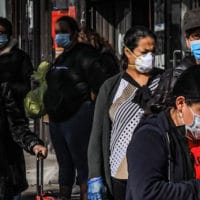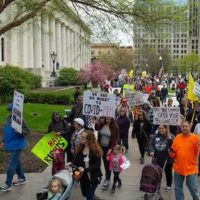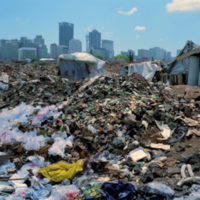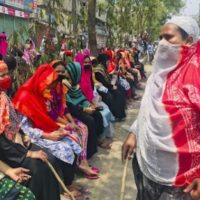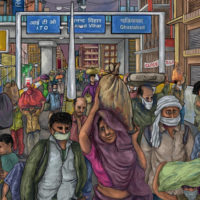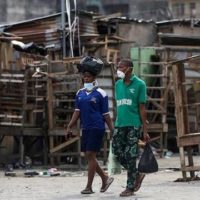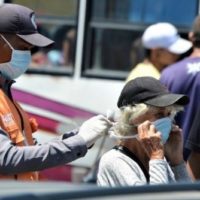-
Growth figures underscore economic crisis amidst COVID
Early evidence on the intensity and drivers of the COVID-induced crisis in the U.S. and Europe suggests that the official response may lengthen the recession and delay recovery
-
Death cult capitalism
Death cult capitalism–now the dominant variety–accepts some losses among the royal caste as an acceptable trade-off for creating a world in which millions of lives are extinguished to lube the system and keep the good stuff rolling in, feeding the insatiable parasites at the top whose lust for short term profits has no end.
-
The 1930s and now: Looking back to move forward
While there are great differences between the crises and political movements and possibilities of the 1930s and now, there are also important lessons that can be learned from the efforts of activists to build mass movements for social transformation during the Great Depression. My aim in this paper is to illuminate the challenges faced and choices made by these activists and draw out some of the relevant lessons for contemporary activists seeking to advance a Green New Deal.
-
Reserve army—pandemic edition
In particular, the existence of a reserve army serves to discipline labor, keeping its wage demands in check, since employed workers are forced to compete with unemployed and underemployed workers for the available jobs.
-
The jungle—pandemic edition
Like nursing homes, the U.S. meatpacking industry has become one of the hotspots of the novel coronavirus pandemic.
-
Can We Simultaneously Oppose Bayer/Monsanto’s Biotechnology and Support Cuba’s Interferon Alpha 2B?
Technology reflects social factors throughout its development and use. Genetically engineered crops allow mega-corporations to patent seeds, lure farmers into buying them with visions of high yields, and then destroy small farmers. Cuba’s drugs are shared throughout the world. Making a distinction between the biotechnology of agro-industry and Cuba requires understanding the difference between bioimperialism and biosolidarity.
-
Disease capitalism and COVID-19: Hunger in the belly of the beast
For capital, profits come from disease, not peoples’ health. COVID-19 shows the consequence of disease capitalism in a globalized world, the rich—countries or individuals—will not be spared either.
-
New York State tries to suspend Democracy; NYT and WaPo shrug
Blaming health risks due to the COVID-19 pandemic, the New York State Board of Elections announced last week that the state would simply cancel its Democratic presidential primary, leaving former Vice President Joe Biden to be proclaimed the victor without a vote. The response from the country’s two most prominent newspapers? Meh.
-
Refusing to die for a confusing slogan
THE government’s latest injunction–Stay alert, Control the virus, Save lives–has come under instant criticism as providing ineffective advice.
-
Mauna Kea: Day 125
This documentary short film captures the meaning and importance of Mauna Kea to the native Hawaiian people and why they stand to protect this sacred land.
-
Trump, asylum, and the Honduran drug traffickers
This is the third time in less than a year that the U.S. government has linked the Honduran chief executive to drug traffickers. President Hernández denies any association with narcotics smuggling.
-
Surviving this pandemic is hard, for America’s most vulnerable, its nearly impossible
This coronavirus pandemic has laid bare the exclusion of whole subsets of the most vulnerable in our society, exemplifying the toxic mix of racism, sexism, imperialism, and capitalism that the U.S. blends so well.
-
Ohio Government invites employers to secretly report “work refusal” due to coronavirus
AS OHIO BEGINS to ease restrictions and reopen its economy, the state is inviting employers to report employees who don’t show up for work out of concerns about the coronavirus for possible unemployment fraud. This means that workers who stay home because of concerns about unsafe conditions at work may be investigated and potentially stripped of unemployment benefits.
-
Capitalism and Nature – A really inconvenient truth
The balance of nature is not the same today as in Pleistocene times, but it is still there: a complex, precise, and highly integrated system of relationships between living things which cannot safely be ignored any more than the law of gravity can be defied with impunity by a [person] perched on the edge of a cliff. The balance of nature is not a status quo; it is fluid, ever shifting, in a constant state of adjustment. [Humans], too, [are] part of this balance.
-
The COVID-19 catastrophe in Bangladesh
The virus risks plunging Bangladesh into social, economic, and political turmoil—not to mention the public health crisis.
-
Pompeo and the capricious virus
Iran has delivered a devastating blow to the ego of the Trump administration, puncturing it beyond repair, by its announcement Sunday that mosques will start reopening in low-risk areas of the country from May 5.
-
Dossier 28: CoronaShock: A virus and the World
In December 2019, doctors in Wuhan (China) began to see patients with a kind of viral pneumonia. By the end of the month, an investigation began and China’s health authorities sent out a public warning and notified the World Health Organisation (WHO).
-
The economic crash is already ravaging Africa
Sub-Saharan Africa is facing its greatest crisis in generations. The continent thus far has been less affected by the pandemic than other parts of the world. But the impact of the global economic crisis is already enormous.
-
Bolivia vs Venezuela: COVID-19 response reveals true nature of governments
Government responses to the COVID-19 pandemic have put into sharp relief their true nature. This is perhaps no more evident than when we compare Bolivia and Venezuela.
-
It’s crucial to distinguish between can’t and won’t—with a million lives at stake
CNN should note that accepting a 60–70% infection rate means accepting a million deaths or more, assuming a fatality rate of 0.5%—which may be a conservative estimate.

